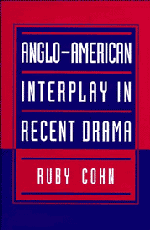4 - Reading and teaching
Published online by Cambridge University Press: 19 March 2010
Summary
My next two Anglo–American pairings should be read in tandem, since they react to patriarchies on both sides of the Atlantic. Any fair-minded audience recognizes the sexist heritage of Eurocentric (but not only Eurocentric) drama, and early feminists expended a good deal of energy in proving that women characters of classical Western literature suffered from that bias. I suppose my pairing of David Rabe and David Hare treads that well-worn critical path, but I do not follow another such path, where superior women characters are found to populate plays written by women. Instead, I examine how actual writing, often a form of instruction, functions in the dramas of the women writers, Maria Irene Fornes and Caryl Churchill.
Contemporary critics of culture have assigned a privileged role to writing, in the wake of Jacques Derrida. French feminists have praised l'écriture féminine as fluid, open, emotional, polysemic, and, with imperturbable polarity, either subversive or nurturing. French feminist critics juxtapose l'écriture féminine against the phallogocentric discourse of the Western tradition. Only occasionally do French feminists penetrate specific texts, and then it is mainly poetry, fiction, or philosophy – genre designations that some feminists disallow. English and American feminists tend to be more aware than French of the contexts of texts. In the succinct summary of Elaine Showalter: “English feminist criticism, essentially Marxist, stresses oppression; French feminist criticism, essentially psychoanalytic, stresses repression; American feminist criticism, essentially textual, stresses expression” (quoted in Felski, Beyond Feminist Aesthetics, p. 20). Although I am confused about what feminism entails, I do hew to the American stress on expression, and I have brooded about an écriture féminine in drama.
- Type
- Chapter
- Information
- Anglo-American Interplay in Recent Drama , pp. 94 - 116Publisher: Cambridge University PressPrint publication year: 1995



